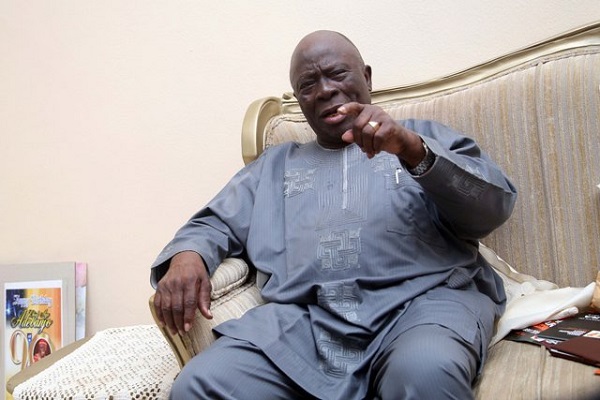Recently when I think of Ayo Adebanjo, I remember Ernest Hemmingway’s novella, The Old Man and the Sea. It is a small but resonant epic. But it is a story that the Nobel Prize winner who died a suicide compels biographers to see as his self-portrait.
When French hero and leader Charles De Gaulle stepped into his twilight, he recalled Hemmingway’s masterpiece and wondered whether he (de Gaulle) was not an old man who had only a skeleton to tell his sojourn on earth. I am beginning to view the old man of Yoruba politics in that light. Grouchy Adebanjo may be the old fisherman in the tale who caught a big fish in the rough and tumble of the high seas but only arrived home with a skeleton. A shark had made a mincemeat of his great catch. He may end up like King Lear, who earned no love from his three daughters and no love for himself and went into that “good night” a loner.
Many who follow his geriatric path must know that this man’s grouse did not begin with his endorsement of the Labour Party candidate. The endorsement is not an act of defiance. It is a symptom of a pathology. You can call it the contrarian syndrome. A man who must play spoiler in order to attract attention. His is an enterprise as stormy petrel. He is the public desperado banging his shoes to gain attention.
Adebanjo has been with the Yoruba political establishment since the days of the great sage Awo. Awo had many with him since he set up the Action group. Sklar and other scholars who wrote of Awo and his associates noted that the man put together a variegated pool. Some on the right, some on the left, some vibrant, others with slow, burning elan, others with the passion of an undercurrent. But Awo, who would leave a legacy of a man of inflexible principle, managed to hug every hog and wine with the swine. It was an early avuncular virtue to create a big tent for his people. He paid for it later with some of the so-called big men looking the other way, one of them was a mensch for the bench, the great Rotimi Williams. Maybe when we shall write a work on the sage, his capacity for rigidity may be traced to his sense of the futility of embracing the opportunists. He may have read Henry David Thoreau, who was Gandhi’s and Luther King’s John the Baptist as an apostle of non-violence. But Thoreau’s relevant point here was when he said, “I am not a joiner.” Why? Because it is like a pig that enters “a sty in order to feel warm.”
Men like Olaniwun Ajayi and Adebanjo survived because the party provided for him a home, a platform but, for most part, a career. And what a career it has been. But he never fought a good fight. Fighting a good fight is not part of the career. Adebanjo would rather fight an inconclusive fight. It provides a pretext to fight again, and that fuels the career. It allows you to hope for another day. The career is not about an ideological win. It is not about principle, except the principal thing is profit. It is all about the tension. With each battle, the career has hope.
In his book, Participations, Chief Bisi Akande calls him “organising secretary,” a euphemism for a party hustler. Recently, Chief Segun Osoba lashed out at him in quite the same strain. He unveils him as an electoral coward who would stalk in the shadows while others fight in an election. He is not one to test his mettle in a poll. He has no stern stuff for that. He has no grassroots credibility. He has no organising skill. But he is an expert heckler, a serial complainant, querulous and quarrelsome, skating, baying, baiting and hating. As an old man you expect him to mellow. Rather he bellows. He is no Isocrates who warned Greece before it fell. Or the blind prophet in Sophocle’s plays who restrains kings. He is bitter and swaggers in it.
But he is a schemer, too. When the group was in its tested hour, he was seen to work as a fifth columnist. No better evidence than one of the Afenifere’s best, the man Bola Ige. What this essayist wrote here on July 4, bears rehashing:
 Hottestgistnaija.com
Hottestgistnaija.com





